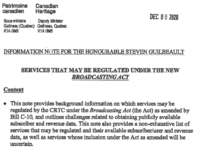Weeks into a high profile debate over Bill C-10, the issue of discoverability of Canadian content has emerged as a policy tug of war between supporters that want the CRTC to intervene by mandating the discoverability of Canadian content on sites such as Youtube and Tiktok and critics that argue the approach would raise significant freedom of expression and net neutrality concerns.
But what exactly is “discoverability” and how would it impact both users and the thousands of Canadian creators that have already found success on digital platforms?
Fenwick McKelvey is a communications professor at Concordia University who has written more about the discoverability and algorithmic media than anyone in Canada. He has regularly participated in CRTC hearings and was the co-author of a leading study on the issue commissioned by Canadian Heritage. He joins the Law Bytes podcast to talk about discoverability, his frustrations with its implementation in Bill C-10, and the potential consequences for Canadian creators.











